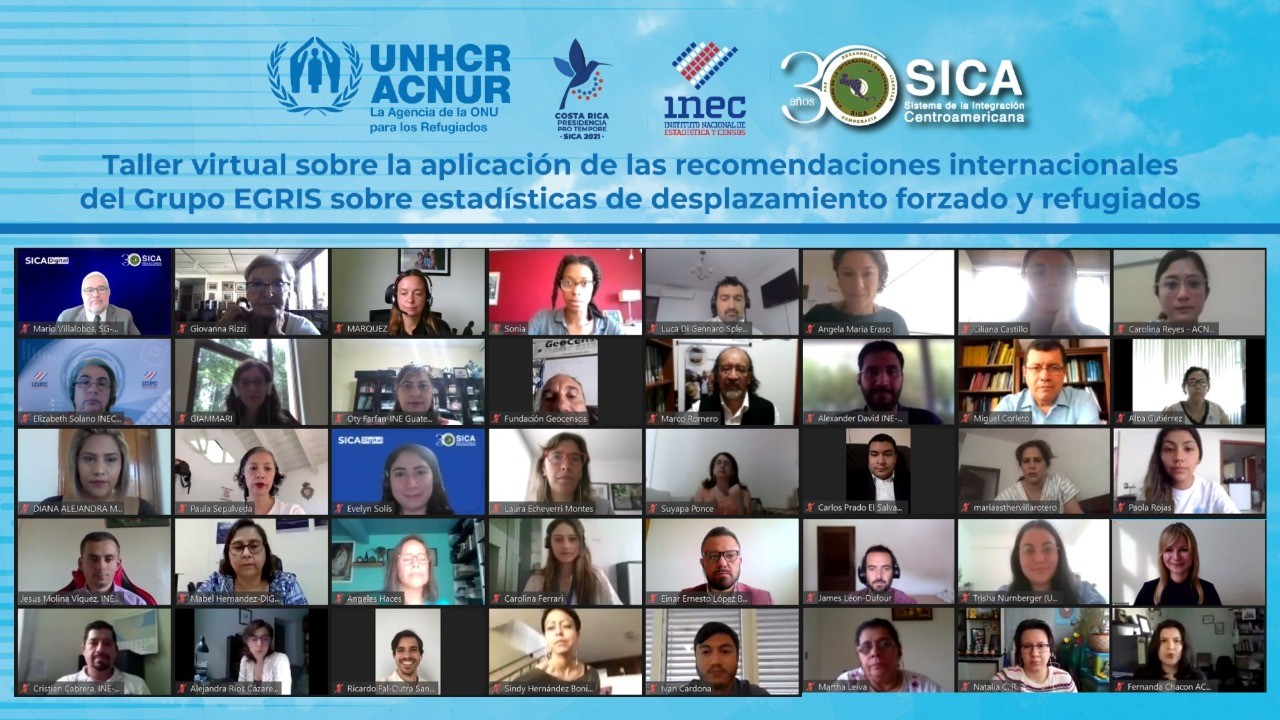
By Luca Di Gennaro and Laura Giammarinaro, UNHCR DIMA Americas
On the 7th and 8th of June 2021, UNHCR together with CENTROESTAD-SICA convened a virtual workshop on ‘The Implementation of the International Recommendations on Forced Displacement Statistics of the Expert Group on Refugee and IDP Statistics (EGRIS)’. The workshop was held in Spanish. The objective of the workshop was to raise awareness on the international recommendations and discuss their implementation in the region. CENTROESTAD, located in El Salvador, is the statistics office of the Central American Integration System (SICA). SICA included 8 countries: Belize, Costa Rica, El Salvador, Guatemala, Honduras, Nicaragua, Panamá, and Dominican Republic.
The workshop lasted one day and a half. The first half day was dedicated to the presentation of the National Statistical Offices (NSOs), the Spanish version of the book International Recommendations on Internally Displaced Persons Statistics (IRIS; EGRIS, 2020) and the theoretical framework. The second half day was addressed to experience from Mexico, Colombia and other countries. The last half day was dedicated to the interaction among participants and organizers and to explain what a National Statistics Office is.
The final agenda in Spanish shared with participants can be found here.
Objectives of the workshop
Statistics in UNHCR follows the overall guidance set by the Expert Group on Refugee and Internally Displaced Persons (EGRIS). EGRIS comprises over 40 national statistical and immigration authorities, the Steering Committee and around 25 regional/international organizations. EGRIS was formally established in 2016 by the UN Statistical Commission (the highest-level institution on official statistics in the world). The overall objective of EGRIS is to improve international statistics on refugees and internally displaced persons (IDP) through the development of international recommendations on how to collect, compile and disseminate statistics on asylum seekers, refugees, and IDPs. Two EGRIS handbooks set out key statistical recommendations: The International Recommendations on Refugee Statistics (IRRS) and the International Recommendation on IDP Statistics (IRIS).
During the workshop, the Spanish version of ‘International Recommendations on Internally Displaced Persons Statistics’ (IRIS) was presented for the first time. The main aims of the workshop were to meet and engage the National Statistics Offices of Central America and discuss the implementation of EGRIS recommendations in the sub-region. The quality of data in statistics is crucial. Only the National Statistics Offices can guarantee high quality data, continuity, and independence to obtain the best quality data. The National Statistics Offices are strategic partners of UNHCR for the statistical production of data on refugees and IDPs.
As a result of UNHCR’s Data Transformation Strategy and the regionalization process in the Americas, improving data quality and collaborating with National Statistical Offices in the production of data on refugees and IDPs, is a key priority.
Take away from the workshop
First, there is a need for this kind of workshop in the Americas: the workshop received great participation and positive feedback and comments. Secondly, there is space to introduce questions in the next census and survey of NSOs: Four National Statistics Offices have committed to introduce questions on internal displacement in their forthcoming census or household surveys. Thirdly, work and dissemination of content in Spanish is essential in the region. Of course, English is also widely present in Canada, USA, Belize, and in some Caribbean countries as well as Portuguese in Brazil. Fourthly, UNHCR needs to sensitize country offices to EGRIS recommendations and to communicate better to country offices why NSOs are strategic partners.
Follow up
UNHCR in the Americas will begin bilateral meetings between UNHCR Country Offices and the National Statistics Offices that were present in the workshop. UNHCR operations/statistics focal points will be responsible to engage National Statistics Office on data on refugees and IDPs.
During the workshop it was announced that a second workshop in person in 2022 will be held to strategize on capacity building. This second workshop will be concentrated in the implementations and hopefully on data in the Americas. And, it will open for research contributions from the university.
The replication of similar workshops or roundtable discussions engaging other sub-regional organizations in the region: Andean Community, Mercosur etc., by using existing internal contacts and the links with other UN agencies (for instance: Comisión Económica para América Latina y el Caribe, ECLAC/CEPAL). The collaboration with other UN offices can advocate our need for data and take advantage of their expertise and network. Regional organizations can also help to spread EGRIS recommendations on data and statistics.
Participation: Engaging staff & Organizations
EGRIS members were in many sessions, sharing more information about the statistical recommendations and its third pace of work. EGRIS members, such as Mexico and JIPS also presented their efforts and concrete experience as well as the implementation of the recommendations.
The participation positively met the expectations of the organizers. More than 100 participants registered, 86 participates at the opening, and 44 completed the post-workshop questionnaire. More than 10 different National Statistics Office (Ukraine, Mexico, Colombia, Chile, Belize, Costa Rica, El Salvador, Guatemala, Honduras, Nicaragua, Panama and Dominican Republic) and more than 25 NSO staff. More than 20 speakers and moderators: Included two former directors of the National Statics Office (El Salvador and Chile). There were many organizations involved: CENTROESTAD, SICA, JIPS, JDC, Inter-American Development Bank, NGOs, Refugee’s Commissions (Government) and UNHCR.
Post-assessment questionnaire
\
A post-assessment questionnaire was distributed online. 44 participants participated in the questionnaire: 19 from UNHCR, 7 from NSOs and the remaining 18 from other organizations. For 60 % of respondents, it was the first time they were presented to the work of EGRIS. 97% of respondents believe the presentations provided relevant guidance on EGRIS Recommendations.
The graph shows that 96% of respondents believe it would be possible to implement the EGRIS recommendations in their context/country.

For more information on the event, please contact Luca di Gennaro ([email protected]). Please also find relevant links and social networks below:
